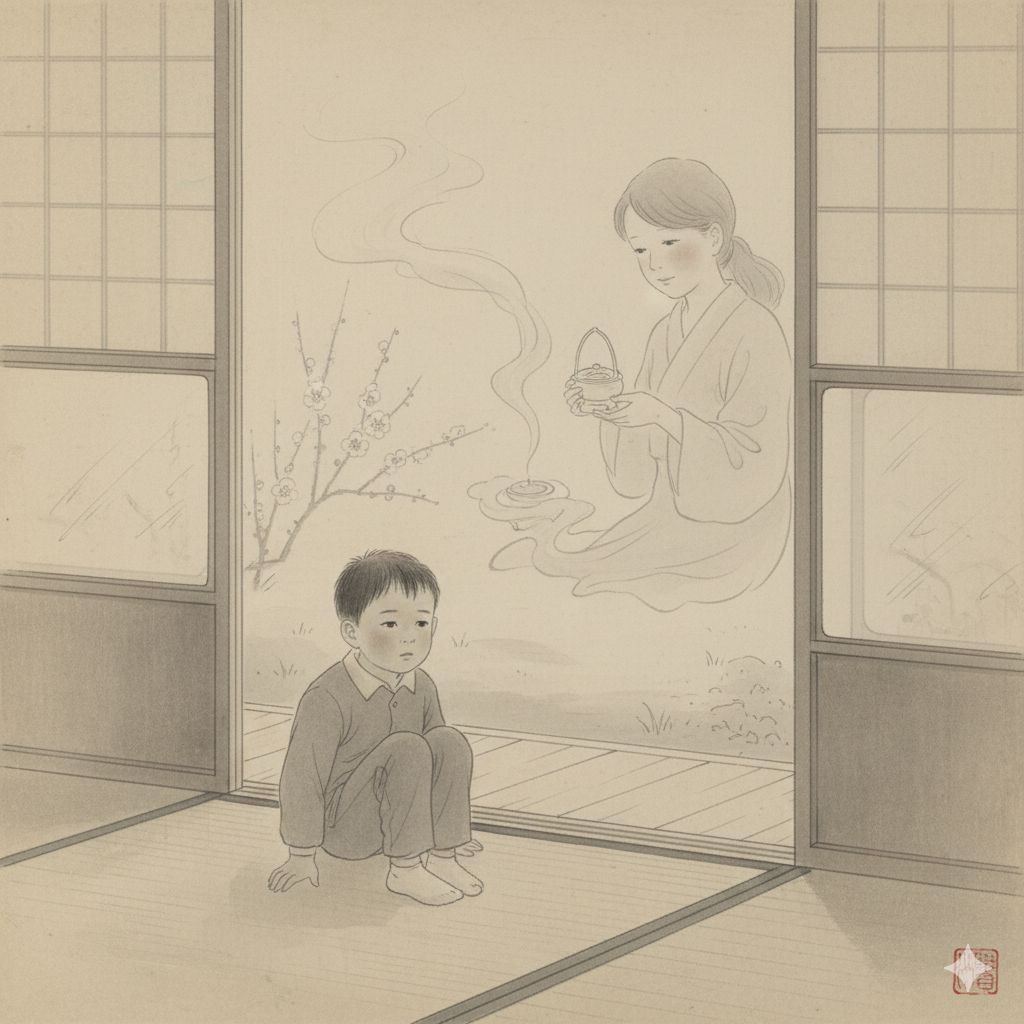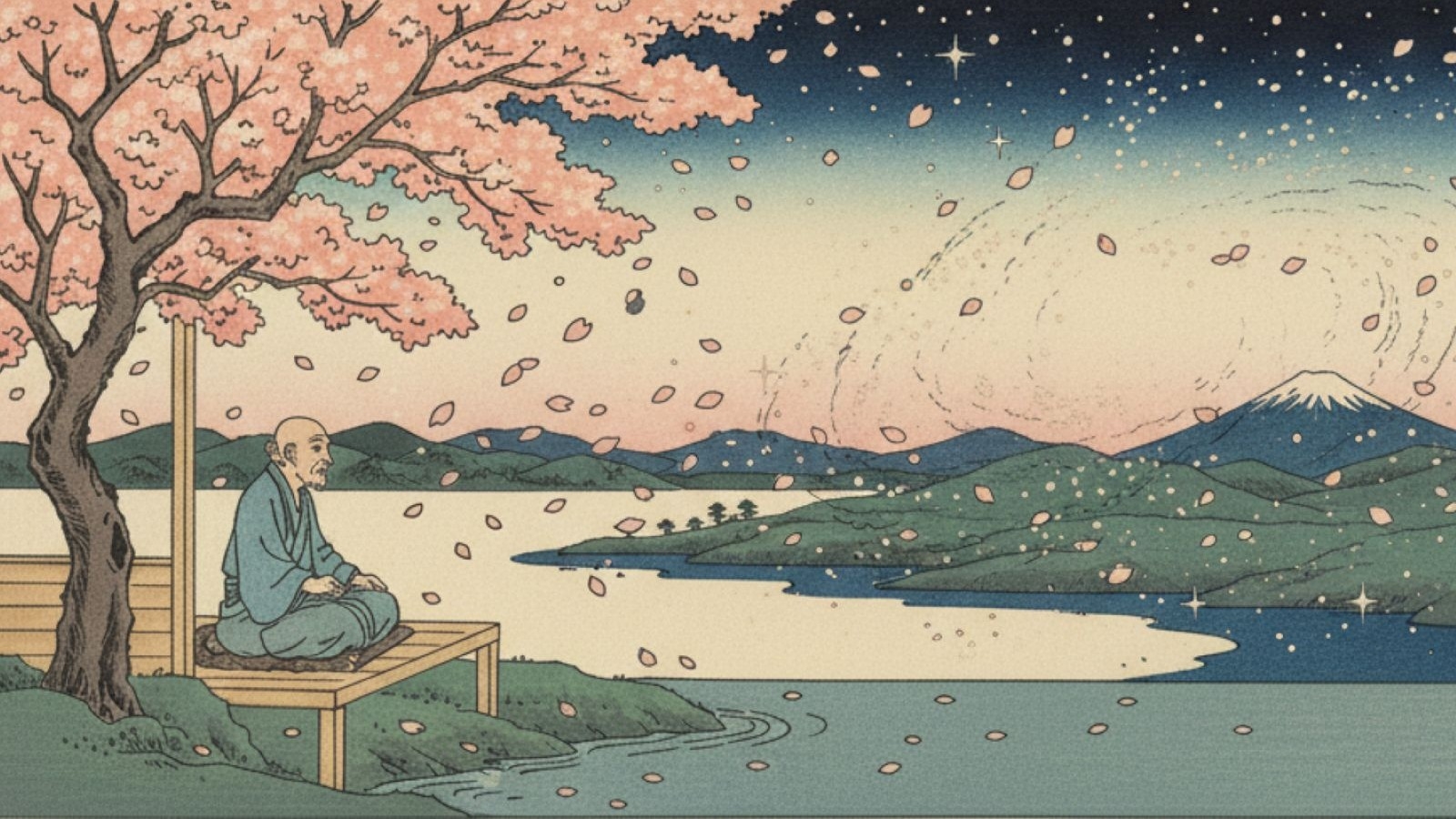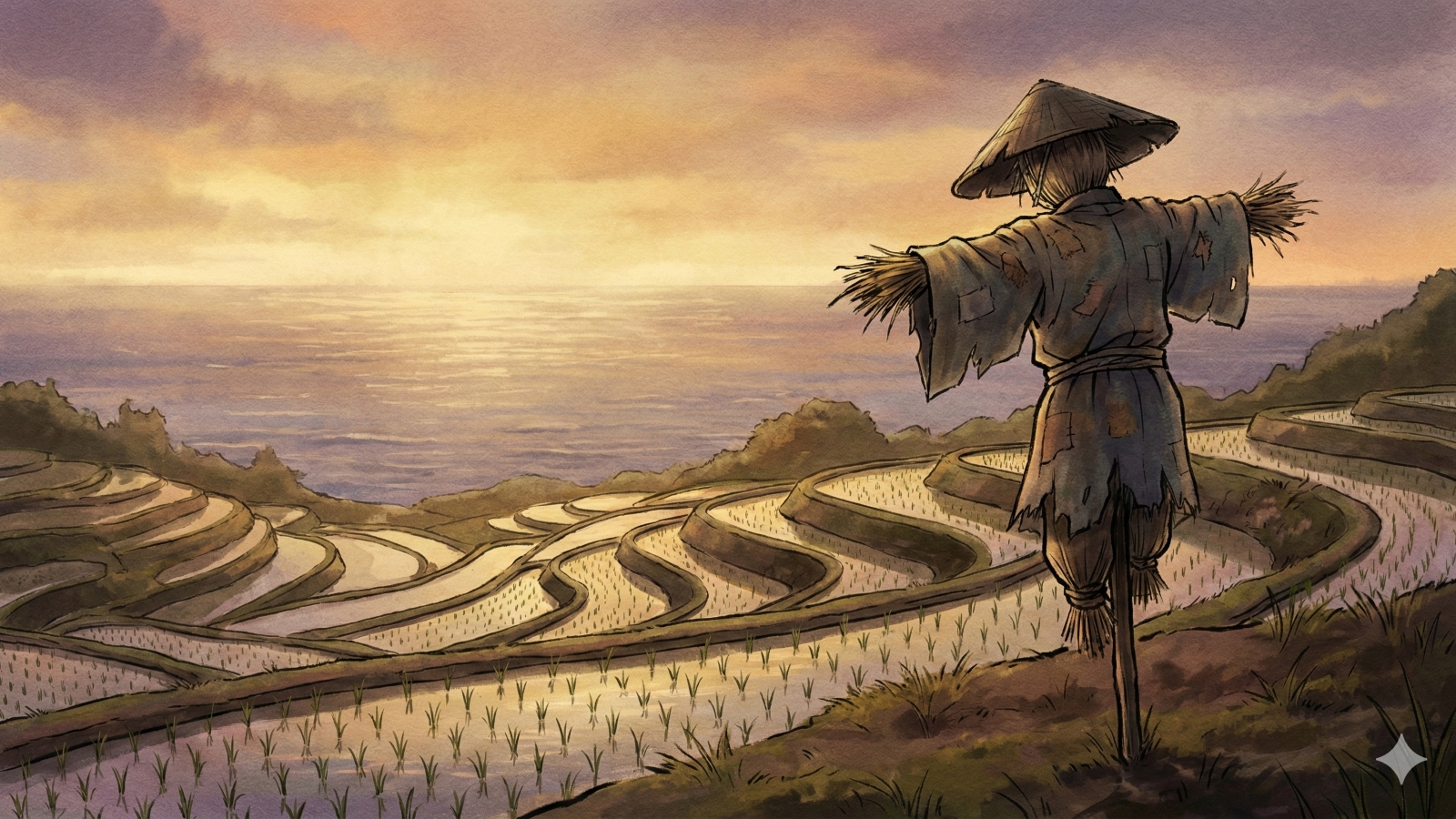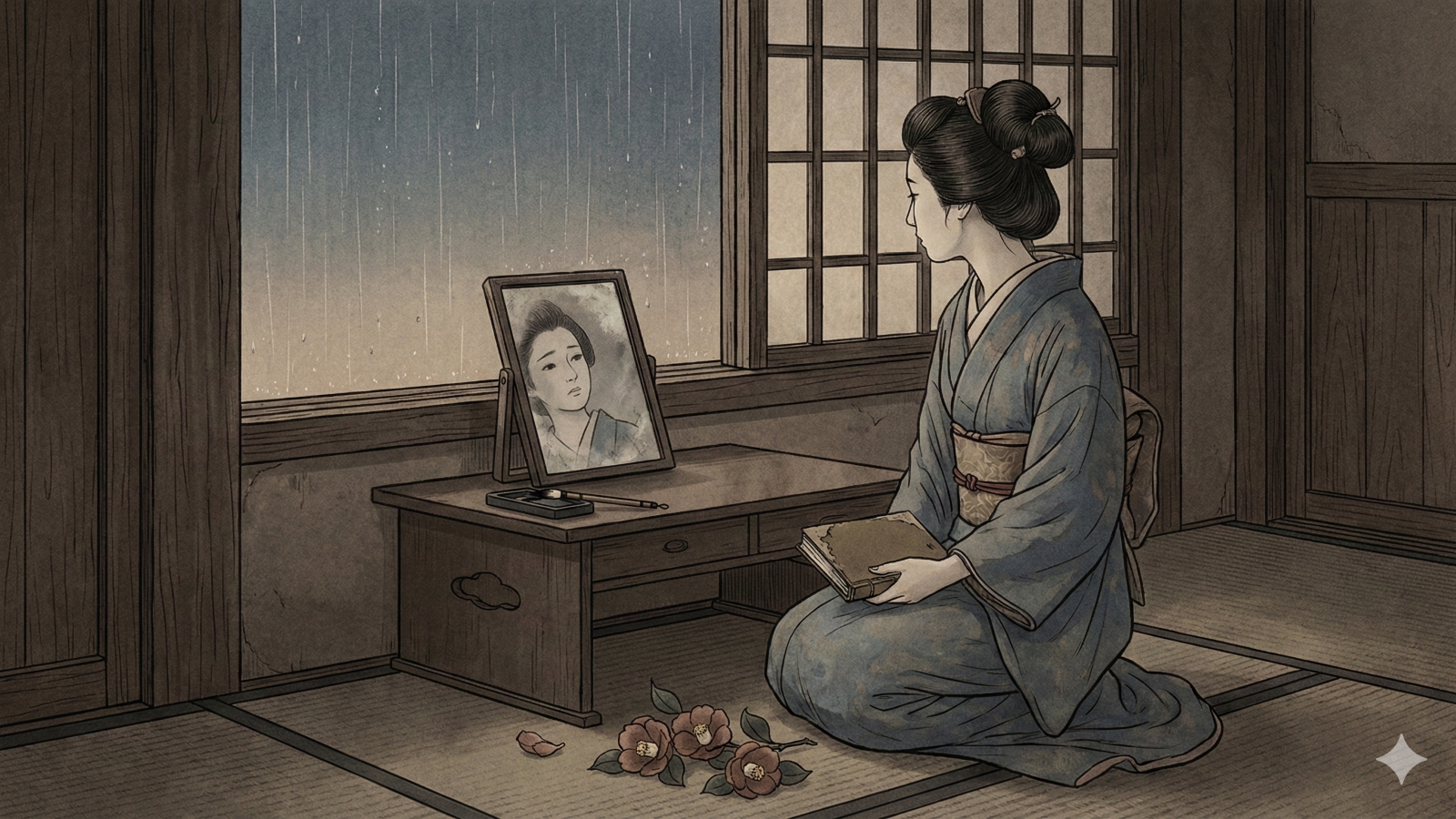Flow and Resolve - Literary Masters on Confronting Fate
When faced with a fate beyond our control, what should we do? Should we lament and give up? Or should we find the "resolve to live" within that very flow? The words left by Natsume Soseki, Masaoka Shiki, and Tanizaki Junichiro are etched with the strength and dignity of humanity that lies beyond impermanence.

「運の悪い時には何事も思うように行かんもので」
“When you’re out of luck, nothing ever seems to go your way.”
—— Natsume Soseki, I Am a Cat
[Commentary]
Life doesn’t always go according to plan, does it? This line is a lament from the protagonist, Kushami-sensei, who has fallen ill just before his annual, much-anticipated trip to the theater. His simple plan to please his wife is about to crumble due to a sudden chill and dizziness. In this, we see the presence of “luck”—something beyond one’s will or effort—and a sense of resignation to the transience of a life where things rarely go as hoped. Soseki seems to be quietly suggesting, through a comical everyday scene, that this unavoidable misfortune is precisely the fate of humans living in a world of constant change.
「時間と云う分らぬものの流れに棹さして」
“Polling against the flow of that inscrutable thing called time.”
—— Natsume Soseki, The Philosophical Foundations of Literature
[Commentary]
If life is a voyage, what kind of sea are we rowing upon? This poetic phrase appears in a collection of lectures where Soseki discusses his philosophy and views on art. He saw human existence as that of a fleeting traveler, desperately polling a boat through the vast current of “time,” whose nature and destination are unknown. One can almost see the figure of a person struggling, trying to live, within the great flow of a fate beyond their control. This grand and somewhat unsettling image makes us feel both the impermanence of life and the nobility of the human will that confronts it, inviting us into deep contemplation.
「ただ死と云う事だけが真だよ」
“Only the thing called death is real.”
—— Natsume Soseki, The Poppy [Kono-san]
[Commentary]
Have you ever felt that there is nothing certain in this world? This line is muttered by Kono-san, a world-weary philosopher, in a conversation with a friend. He believes that all matters of human society are as uncertain and transient as a dream. For him, the only certain thing, the one undeniable truth, is “death.” This cold, hard statement cuts through to death as the ultimate reality that lies beyond the transience of life and the impermanence of things. This strong, almost nihilistic assertion paradoxically seems to pose a sharp question to the reader: precisely because of this, how will you spend the uncertain time you have “while alive”?
「ただ淡い薫を残して消えた香のようなもので、ほとんどとりとめようのない事実である。」
“It is a fact almost impossible to grasp, like incense that has vanished leaving only a faint scent.”
—— Natsume Soseki, Inside My Glass Doors
[Commentary]
Memories of the distant past can be like a faint fragrance, slipping through our fingers when we try to grasp them. This beautiful sentence appears in an essay where Soseki reflects on his early childhood and traces the image of his mother, who passed away when he was young. He recounts that stories of where his mother was born or what kind of service she performed have now lost their tangible feel, becoming as uncertain and fleeting as a fading scent. This metaphor masterfully expresses the concept of impermanence—how human memory and life itself lose their form and become hazy in the great flow of time. The sorrow of even a once-certain past becoming blurred is depicted with a quiet and elegant touch.
「代助は渝らざる愛を、今の世に口にするものを偽善家の第一位に置いた。」
“Daisuke ranked those who spoke of unchanging love in this day and age as the foremost of hypocrites.”
—— Natsume Soseki, And Then
[Commentary]
Unchanging love and the ever-shifting heart. Perhaps it is human nature to waver between the two. This line comes from a scene where the protagonist, Daisuke, coolly analyzes the psychology of men and women in the stimulating, encounter-filled life of the city. He concludes that the human heart is constantly changing due to its environment and new encounters, and that in such a world, to speak of “unchanging love” is nothing less than self-deception—in other words, hypocrisy. This intellectual gaze sharply points out the “impermanence” of emotions, especially in love, and how fleeting human feelings and relationships can be. The story then follows the course of Daisuke’s own heart, which cannot be so easily explained away by logic.
「病気の境涯に処しては、病気を楽しむといふことにならなければ生きて居ても何の面白味もない。」
“When faced with the circumstance of illness, if you don’t learn to enjoy the illness itself, there is no pleasure in being alive.”
—— Masaoka Shiki, A Six-Foot Sickbed, July 26
[Commentary]
If there is a fate that cannot be changed, do you continue to lament, or do you search for another path? From within his harsh life on a sickbed, Shiki discovered a remarkable state of mind. It was not an attitude of simply giving up and enduring his suffering, but one of “enjoying” the very state of being ill. If one only laments unavoidable pain, the joy of being alive itself is lost. Therefore, he argued, one should find joy in the workings of the mind and the discoveries that can only be found in such a situation, and savor life to the fullest. This is a testament to the culmination of Shiki’s tremendous spirit, a will to live with dignity by confronting the impermanence and absurdity of life head-on.
「悟りといふ事は如何なる場合にも平気で死ぬる事かと思つて居たのは間違ひで、悟りといふ事は如何なる場合にも平気で生きて居る事であつた。」
“I was wrong to think that enlightenment meant being able to die calmly in any situation; enlightenment was being able to live calmly in any situation.”
—— Masaoka Shiki, A Six-Foot Sickbed, June 2
[Commentary]
The resolve to die, and the resolve to live—which requires a stronger spirit? With this contrasting sentence, Shiki reveals how his interpretation of Zen “enlightenment” (satori) had changed. He once believed that enlightenment meant being able to die peacefully at any time. However, at the end of his long suffering, he realized that true enlightenment was the ability to “live calmly” without being perturbed, no matter how harsh the circumstances. This is a state of mind that can only be reached by one who has truly experienced the immense struggle of living through each day while facing a certain fate of death. Here, a powerful shift in perspective is declared: not to simply accept a fleeting life and fade away, but to affirm that very fleeting life until the very end.
「果して病人の眼中に梅の花が咲くであらうか。」
“Will plum blossoms truly bloom in the eyes of a sick man?”
—— Masaoka Shiki, A Six-Foot Sickbed, August 20
[Commentary]
If the future is uncertain, what does one see in the turning of the seasons? This line was uttered by Shiki, who continued to write essays from his sickbed, after he had finished one hundred days’ worth of his diary and was faced with the envelopes for the remaining two hundred days. Two hundred days is more than half a year away, the season when plum blossoms bloom after the harsh winter has passed. Will he, he wonders, be able to see that beautiful sight? This quiet question is filled with the poet’s earnest heart, thinking of the beauty of the coming season while constantly aware of the shadow of death. This query into the transience of his own life, coming immediately after the relief of having survived another day, is a poignant crystallization of the concept of impermanence that pierces the reader’s heart.
「人間のいとなみのあとかたもなく消えてしまう果敢なさをあわれみ、過ぎ去った花やかな世をあこがれる」
“Pitying the transience of human endeavors that vanish without a trace, and longing for the brilliant world that has passed.”
—— Tanizaki Junichiro, Ashikari
[Commentary]
The lively voices have vanished into the water’s surface, and only the moonlight illuminates the ancient river. This line comes from a scene where the narrator, gazing at the moon on an autumn night by the Yodo River, reflects on how this place was once “the greatest pleasure ground on earth,” bustling with courtesans and boats. The contrast between the memories of brilliant prosperity recorded in old texts and the silent, desolate landscape before him evokes a powerful sense of melancholy. It speaks frankly of pitying the ephemerality of human activities that disappear without a trace, and of yearning for a glamorous world that is no more. This sentence, where nostalgia and a sense of impermanence merge, masterfully portrays the sorrowful yet beautiful sentiments of an individual standing within the flow of history.
「どうせいつまでながらえられる憂き世の中ではないのだから、歩き倒れて死ぬところまで行ってみよう」
“Since this sorrowful world is not a place one can endure for long anyway, I will walk until I collapse and die.”
—— Tanizaki Junichiro, The Three Priests
[Commentary]
When all is lost, where does a person begin to walk? This passage expresses the resolve of a samurai who, betrayed by his lord, renounces the world to become a monk and sets out on a training pilgrimage. He holds a sense of resignation that this world is not a place where one can live for long. Based on that, he makes a grim resolution to simply wander the provinces and keep walking until he collapses and dies. It shows a fierce will, born from a clear-eyed view of life’s transience (the “sorrowful world”). While seemingly destructive, it reveals a noble way of life—of taking one’s fate into one’s own hands—and suggests a human strength that lies beyond the acceptance of impermanence.
(Editorial Assistance: Haruna Ishita, Momona Sassa)

Japanese Views on Seasons - The Gaze of Literary Figures
Japanese literary figures have deeply engaged with the shifting seasons and the workings of life through various forms of expression such as novels and essays. Their delicate sensibilities and keen powers of observation open the door to a dialogue with nature for us, teaching us the beauty and philosophy hidden within everyday landscapes.

Japan's Primal Landscapes - A Tale of Memories Told by the Land
Superimposing the deceased onto the buzzing of flies, seeing gods in one-legged scarecrows. For Japanese people, these mysterious stories were not fantasy, but "life" itself, right next door. Longing for lands beyond the sea, legends remaining in ancient mounds. Why not travel through the frightening yet gentle "primal landscapes of the heart" gathered by Kunio Yanagita, Lafcadio Hearn, and others?

To Wonders Beyond Logic - The Beautiful Abyss Peered into by Scientists
Science is not just cold calculations. It is awe for nature beyond human understanding and an endless quest for beauty. Seeing the universe in a snowflake, feeling the ferocity of life in roadside grass... These are the adventurers of knowledge who confronted the overwhelming "mysteries" that appear only at the end of logic. We touch upon the records of their quiet yet passionate souls.

The Soul Screaming "I" - Stories of Fate and Pride by Modern Women
Should women's lives be plastered over with resignation to fate? Or is it a battle to break through social barriers and win one's own "life"? The dry self-mockery spat out by Ichiyō, the poignant scream released by Akiko for her beloved. We listen to the cries of their souls as they resisted the chains of their era, struggling through the mud to establish the "self."